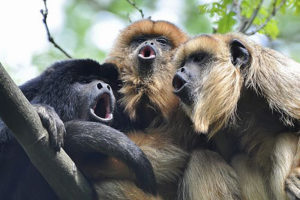A new study finds that howler monkeys scream louder when they have smaller testicles.

The study, published last week in the journal Current Biology, said that howler monkeys with deep roars — used to attract females, deter love rivals and scare off predators — tend to also have smaller testicles and a shortage of sperm compared to their peers.
Biological anthropologist Jacob Dunn and his team from Cambridge University wanted to see if there was a negative correlation between the size of a howler monkey’s vocal tract and the size of his testicles.
The team used 3D laser scanners to analyse a cup-shaped chamber in the howler monkey’s throat called a hyoid that acts an echo chamber.
Dr. Dunn said: “The results of our acoustic analyses show that howler monkeys produce roars at a similar frequency as tigers, which is far lower than we would have predicted from their body size, yet exactly what would be predicted from measuring their giant vocal folds’ which are three times bigger than in a human.”
Howler monkeys can be found in the forests of Central and South America and weigh roughly 15 pounds, but their growl can reach 128 decibels, which is equivalent to the roar of a tiger.
The researchers speculate that this is because howler monkeys want to give the impression that they are bigger than they actually are.
Dr. Dunn proposed: “It may be that investment in developing a large vocal organ and roaring is so costly that there is simply not enough energy left to invest in testes.
“Alternatively, using a large vocal organ for roaring may be so effective at deterring rival males that there is no need to invest in large testes.”
The study furthered that males with bigger hyoids had smaller testicles and lived in smaller social groups where there was a single male dominating a number of females.
Male howler monkeys with bigger testes and smaller hyoids most likely lived in bigger social groups and had to share partners.
Dunn said: “In evolutionary terms, all males strive to have as many offspring as they can, but when it comes to reproduction you can’t have everything.”
According to Charles Darwin, writing on how species’ evolutionary choices impact each other in “On the Origin of Species”: “The whole organism is so tied together that when slight variations in one part occur, and are accumulated through natural selection, other parts become modified.”
By Riley Schatzle, NextShark
